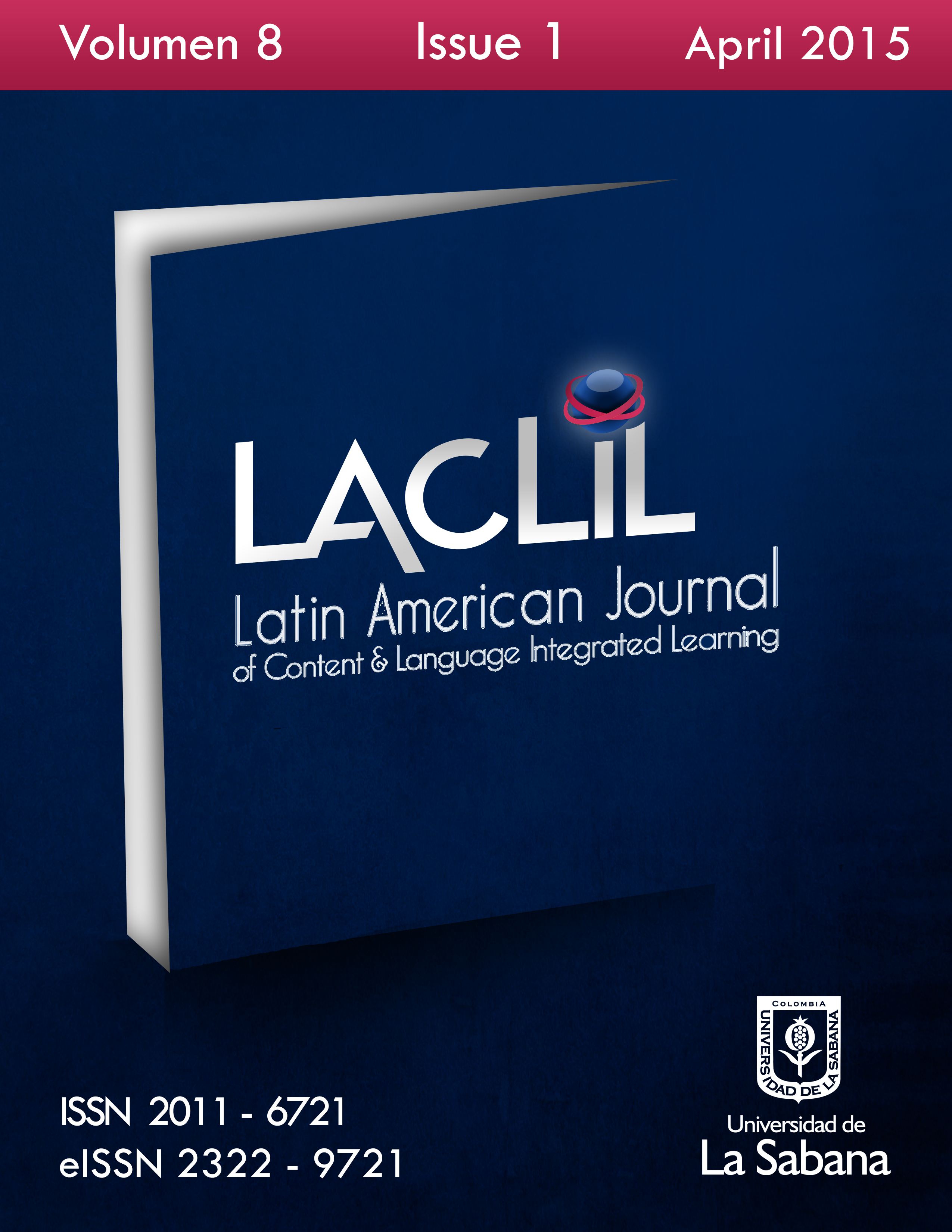Cognitive task complexity effects on L2 writing performance: An application of mixed-methods approaches
DOI:
https://doi.org/10.5294/5279Palabras clave:
complejidad de la tarea cognitiva, actuación lingüística, enfoque de métodos mixtos.Resumen
Este artículo ofrece una revisión metodológica de investigaciones previas sobre la complejidad de tareas cognitivas, desde que surgió término en 1995, e investiga por qué tanta investigación era más cuantitativa que cualitativa. Por otra parte, arroja luz sobre los estudios que utilizaron el enfoque de métodos mixtos y determina cuál versión de los diseños de métodos mixtos se utilizaba con frecuencia. Los resultados revelan que muchos estudios en el campo de la investigación basada en la tarea cognitiva usaban un diseño experimental cuantitativo más que cualitativo para recoger e interpretar sus resultados. Estos estudios se orientan más al postpositivismo apoyado por una epistemología objetivista. Sin embargo, pocos estudios utilizaron el enfoque de métodos mixtos para considerar los efectos de la complejidad de la tarea cognitiva en el desempeño lingüístico en contexto de L2. La perspectiva teórica detrás de estos estudios fue el pragmatismo. Los estudios de métodos mixtos sólo utilizan el diseño secuencial explicativo para recoger datos e interpretar sus resultados, mientras que otras versiones de los diseños de investigación de métodos mixtos se quedaron sin definir. Para concluir, el documento identifica la brecha actual en la metodología de los estudios y ofrece recomendaciones sobre cómo obtener resultados más amplios y generalizables mediante la utilización de otras versiones de los estudios de métodos mixtos.Descargas
Citas
Crotty, M. (1998). The foundations of social research: Meaning and perspective in the research process. London: Sage Publications.
Duffy, T. M., & Jonassen, D. H. (1992). Constructivist and the technology of instruction: A conversation. Hillsdale, NJ: Lawrence Erlbaum Associates.
Eagleton, T. (2003). After theory. New York: Basic Books.
Ellis, R., & Yuan, F. (2004). The effects of planning on fluency, complexity, and accuracy in second language narrative writing. Studies in Second Language Acquisition, 26(1), 59-84. doi:10.1017/s0272263104026130
Farahani, K. A. A., & Meraji, S. R. (2011). Cognitive task complexity and L2 narrative writing performance. Journal of Language Teaching and Research, 2(2), 445-456. doi:10.4304/jltr.2.2.445-456
Heidari-Shahreza, M. A., Dabaghi, A., & Kassaian, Z. (2011). The effects of manipulating task complexity on the occurrence of language-related episodes during learner-learner interaction. Porta Linguarum, 17, 173-188.
Kim, Y. (2009). The effects of task complexity on learner-learner interaction. System, 37, 254-268. doi:10.1016/j.system.2009.02.003
Kuiken, F., & Vedder, I. (2007). Task complexity and measures of linguistic performance in L2 writing. International Review of Applied Linguistics, 45(3), 261-284. doi:10.1515/iral.2007.012
Kuiken, F., & Vedder, I. (2008). Cognitive task complexity and written output in Italian and French as a foreign language. Journal of Second Language Writing, 17, 48-60. doi:10.1016/j.jslw.2007.08.003
Ong, J., & Zhang, J. L. (2010). Effects of task complexity on the fluency and lexical complexity in EFL students' argumentative writing. Journal of Second Language Writing, 19, 218-233. doi:10.1016/j.jslw.2010.10.003
Philp, J., Oliver, R., & Mackey, A. (2006). The impact of planning time on children’s task-based interactions. System, 34, 547-565. doi:10.1016/j.system.2006.08.004
Rahimpour, M., & Hosseini, P. (2010). The impact of task complexity on L2 learners’ written narratives. ELT Journal, 3(3), 198-205. doi:10.5539/elt.v3n3p198
Robinson, P. (2001). Task complexity, task difficulty, and task production: Exploring interactions in a componential framework. Applied Linguistics, 22(1), 27-57. doi:10.1093/applin/22.1.27
Robinson, P. (2003). The cognition hypothesis, task design, and adult task-based language learning. Second Language Studies, 21(2), 45-105.
Robinson, P. (2005). Cognitive complexity and task sequencing: Studies in a componential framework for second language task design. International Review of Applied Linguistics, 43, 1-32. doi:10.1515/iral.2005.43.1.1
Salimi, A., Dadaspour, S., & Asadollahfam, H. (2011). The effect of task complexity on EFL learners' written performance. Procedia Social and Behavioral Sciences, 29, 1390-1399. doi:10.1016/j.sbspro.2011.11.378
Sasayama, Sh. (2011). Cognition hypothesis and second language performance: Comparison of written and oral task performance. Second Language Studies, 29(2), 107-129.
Skehan, P. (1998). A cognitive approach to language learning. Oxford: Oxford University Press.
Skehan, P., & Foster, P. (2001). Cognition and tasks. In P. Robinson (Ed.), Cognition and second language instruction (pp.183-205). Cambridge: Cambridge University Press.
SurveyMonkey [Online software]. (2015). Retrieved from http://www.surveymonkey.com/
Tavakoli, P. (2009). Investigating task difficulty: Learners’ and Teachers’ Perceptions. International Journal of Applied Linguistics, 19(1), 1-25. doi:10.1111/j.1473-4192.2009.00216.x
VanPatten, B. (1990). Attending to form and content in the input: An experiment in consciousness. Studies in Second Language Acquisition, 12(3), 287-301. doi:10.1017/s0272263100009177
Wigglesworth, G., & Storch, N. (2009). Pair versus individual writing: Effects on fluency, complexity, and accuracy. Language Testing, 26(3), 445-466. doi:10.1177/0265532209104670
Descargas
Publicado
Cómo citar
Número
Sección
Licencia
Los autores que publican en esta revista están de acuerdo con los siguientes términos:
Esta revista y sus artículos se publican bajo la licencia Creative Commons Atribución-NoComercial-SinDerivadas 4.0 Internacional (CC BY-NC-ND 4.0), por lo cual el usuario es libre de: compartir, copiar y redistribuir el material en cualquier medio o formato, siempre y cuando: dé crédito de manera adecuada, brinde un enlace a la licencia e indique si se han realizado cambios; no use nuestro contenido con propósitos comerciales; y/o remezcle o transforme el material. Recuerde que no tiene los permisos para distribuir el material si fue modificado.








